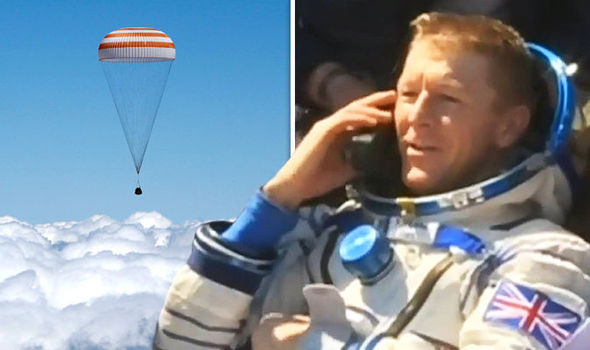‘Best ride I’ve ever been on’ Tim Peake returns to Earth a hero after historic ISS stint

BRITISH astronaut Tim Peake has safely returned to earth after completing his historic mission on the International Space Station (ISS) — and said he was looking forward to a cold beer.
Six months after blasting off into the record-books, the father of two landed back on terra firma this morning when his spacecraft touched down in Karaganda, Kazakhstan at 10.15am.
Moments after leaving his spacecraft, Major Peak told reporters the trip was 'the best ride I've ever been on".
He added: "I'd like some cool rain right now.
"It's very hot in the capsule."
He said he was looking forward to seeing his family again but that he would "definitely miss the view".
Major Peake was the first British astronaut to be sent to the ISS by the European Space Agency (Esa).
The father-of-two took part in more than 250 experiments, performed a space walk, ran the London Marathon on a treadmill, and inspired more than a million schoolchildren.
He even appeared as guest reader on CBeebies' Bedtime Stories.
His feats in space earned him a unique honour from the Queen, who awarded him the Most Distinguished Order of St Michael and St George "for extraordinary service beyond our planet".
Major Peake's space capsule, the Soyuz TMA-19M, undocked from the ISS at exactly 6.52am.
An outside camera showed the spacecraft backing away from the space station with the Earth turning slowly below.
Some four hours earlier Major Peake, American Colonel Tim Kopra, and Russian cosmonaut Yuri Malenchenko had scrambled from the space station into the Soyuz.
The trip home involved a hair-raising plunge through the atmosphere in the tiny middle section of the Soyuz, the descent module.
Friction on the spacecraft's heat shield slowed its speed from 17,398 mph (28,000 kph) to 514 mph (827 kph) and raise the outside temperature to 1,600C.
The rapid deceleration pushes the crew back into their shock-absorbing seats with a force of around five gee — five times normal Earth gravity.
One Nasa astronaut, Doug Wheelock, has described the experience of a Soyuz descent as "like going over Niagara falls in a barrel, but the barrel is on fire".
The capsule landed in remote scrubland more than 200 miles from the major Kazakhstan city of Karaganda.
Recovery crews were on location to help the space travellers out of their capsule and take them for medical checks.
Major Peake and his fellow atsronauts — Commander Yuri Malenchenko and Nasa's Tim Copra — emerged soon after to a hero's welcome.
For his part, Commander Malenchenko became the second most experienced spaceman in history, having now spent 800 days in orbit over several missions.
The astronauts will be helicoptered to Karaganda airport, where according to tradition they will be offered bread and salt and a traditional Kazak hat.
Major Peake will then be flown to the European Astronaut Centre in Cologne, Germany, while his American and Russian colleagues go their separate ways to Houston and Star City, near Moscow.
His mission was named Principia after Sir Isaac Newton's landmark work describing the laws of motion and gravity.
Its primary purpose was to contribute to scientific knowledge by conducting experiments in zero gravity.
But the British astronaut did much more than that as he constantly kept in touch with the world by Twitter, took part in video-linked Q&A sessions, and engaged in educational activities that reached more than a million schoolchildren.
His success in putting Britain on the space-faring map earned him a unique place in the Queen's Birthday Honours list.
Speaking from the ISS he said his space walk, conducted with Col Kopra in January to repair electrical components, was the highlight of his mission.
He added that he was looking forward to "private time" with his family, fresh air, and the feeling of raindrops on his face.
During his time in space Major Peake worked up to 14 hours a day, participating in more than 250 experiments devised by scientists from around the world.
They included numerous studies of his own body's responses to the space environment involving his brain, lungs, stomach, muscles, bones, skin, immune system and body clock.
The tests will continue as he begins a lengthy process of rehabilitation back on Earth.
While weakened muscles recover quickly after a long spell in space, it can take up to three years for bones to return to normal.
Despite their strict exercise regime, astronauts on average lose up to 1.5% of their bone mass for each month spent in space.
Major Peake was originally scheduled to return at the beginning of June, but his homecoming was delayed when the launch of the replacement crew was pushed back.
Политика конфиденциальности | Правила пользования сайтом








